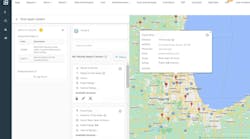ORLANDO, FL –The new TireVigil InTow system, introduced yesterday ahead of the Technology & Maintenance Council (TMC) annual meeting by TireStamp, takes data collected via tire sensors and transmits it over a fleet’s telematics system to TireStamp’s server. It is then compiled and analyzed for the carrier. If trailer tire pressure isn’t within the ranges set by the fleet, the system automatically sends out alerts by email or cell phone text message.
“The benefits of this system is that when a trailer is dropped for long periods of time, it advises the fleet that the unit has a flat tire before a driver is dispatched to pick up the trailer,” said Peggy Fisher, president of U.S. operations, TireStamp. “It also allows the fleet to arrange for tire service at the trailer’s location – eliminating driver delay time and lost productivity.”
Fisher said TireStamp does not manufacture the tire sensor or provide the telematics pathway the fleet needs to use, though it can direct fleets to suppliers of both. Rather she said the company “bridges” the gap between the tire sensors and the communication system using TireStamp’s Tire Data Monitor (TDM). The TDM on the trailer receives power from the tractor when the two are hooked together, and then switches to battery power when disconnected.
Fisher said fleets pay a subscription fee of $5 per month per trailer for the service – about $50 a year per trailer – while the cost of the hardware varies depending on what the fleet already has in place. She noted that the fleet must have a telematics system with wireless connectivity with GPS location ability to use TireVigil InTow.
She also stressed that tires – especially trailer tries – are a major cost center for fleets. “TMC studies have concluded that trailer tires are the worst maintained tires, with only 38% being within plus or minus 5 psi [pounds per square inch] of their target air pressure at any time – with 25% of trailer dual tires having mismatched air pressures greater than 5 psi,” she said. “As a result, TMC’s tire debris studies have confirmed that over 70% of the tires that fail on the road are from trailers.”


